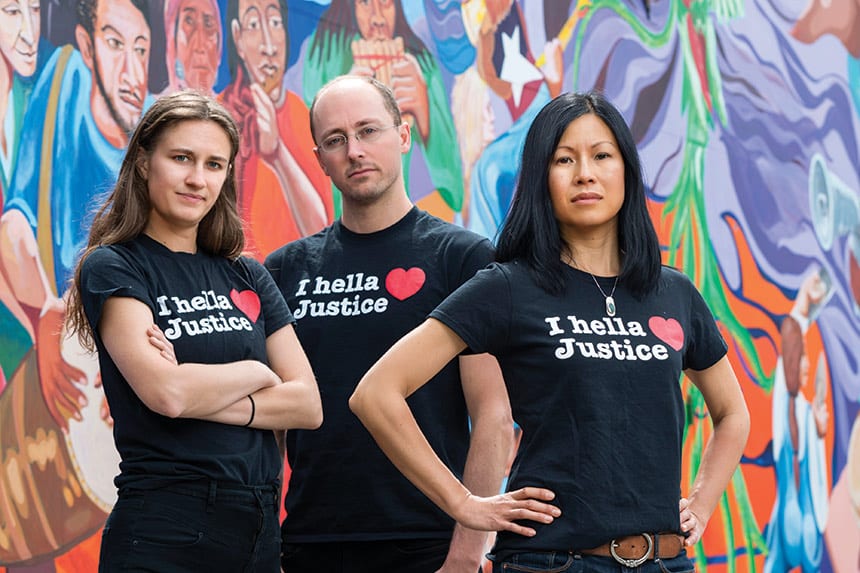
 Immigration policy is an area of growing turmoil, anxiety, frustration—and work. From assisting clients to advocating for reform, Berkeley Law is deeply involved.
Immigration policy is an area of growing turmoil, anxiety, frustration—and work. From assisting clients to advocating for reform, Berkeley Law is deeply involved.
With the recent uncertainty surrounding the Deferred Action for Childhood Arrivals (DACA) program and undocumented people generally, “we’re seeing fear and confusion within the entire immigrant community,” says Linda Tam ’00, who directs the East Bay Community Law Center’s Immigration Clinic. “This work has become more important than ever.”
Tam’s group provides free legal services to low-income immigrants on such issues as DACA, political asylum, victims of crimes and trafficking, deportation defense, visas, immigration consequences of criminal convictions, public benefits eligibility, and naturalization. Attorneys also represent clients before the Asylum Office, U.S. Citizenship & Immigration Services, and Immigration Court, and before the Board of Immigration Appeals.
Soon after DACA’s 2012 launch, Berkeley Law helped create a campus legal services program that provides guidance for undocumented students. Student-led projects, including the East Bay Dreamer Clinic and the Berkeley Immigration Group (BIG), have also helped.
BIG aids detained immigrants awaiting their removal hearings amid the possibility of losing their job, housing, or custody of their children. Students conduct legal intakes with detained non-citizens, observe hearings before the San Francisco Immigration Court, and represent non-citizens in bond proceedings there.
Because 20 percent of people eligible for release on immigration bond (typically around $6,500) cannot afford it, BIG created a fund that funnels donations to pay bond for detainees. Co- director Peter Weiss ’18 says immigrants sometimes sign their own deportation order “just to get out of detention, even though 68 percent of those granted bond are eventually found to not be legally deportable.”
From his view, the U.S. would not tolerate its immigration system “if we were deporting white people in significant numbers.”
“Imprisonment for years without trial, no right to counsel, life-and-death judicial hearings conducted over video screen, these practices are only permitted because we’re predominantly deporting people of color,” Weiss says.
Berkeley Law’s chapter of the International Refugee Assistance Project (IRAP) has 40 students working on cases with clients from Syria, Iraq, Afghanistan, and Sudan. Their work mainly consists of preparing applications and working with clients for their resettlement interviews.
“Refugee populations are in the midst of a humanitarian crisis,” says Berkeley IRAP Co-director Sarah Hunter ’18. “Instead of helping refugees escape a dire situation, governments are vilifying them as terrorists and criminals when they’re actually some of the most marginalized people on the planet.”
Many students engage in immigration field work. As part of a Human Rights Center fellowship at the Lawyers’ Committee for Civil Rights, Sarah Morando Lakhani ’19 coordinated a project to help immigrants formalize their businesses and create asset-securing contingency plans in case of deportation or detention. She also helped prepare a guide for lawyers eager to assist.
“Immigrants launch more than one-fourth of U.S. businesses and employ nearly 6 million workers,” she says. “Immigrant entrepreneurship is something we should be proud of and protect.”
—Andrew Cohen